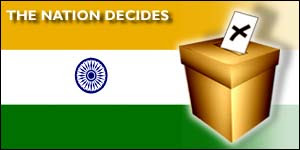
The countdown to the General Elections has begun after a meeting of the Election Commission with all the major political parties, even as the controversy regarding Navin Chawla, who is slated to takeover as the next CEC, refuses to die down.
So, will these elections be any different?
The one aspect that will make a difference is the increase in the representation of the urban voter with respect to rural voter because of delimitation of the constituencies. Delimitation of constituencies is the process of redefining the boundaries of the constituencies to reflect changes in the population pattern. The present constituencies were carved out in 1976. Since then, our demographic pattern has changed and population of the cities has grown from 13% to 28% (2001 census). However, till now only 13% if the Lok Sabha seats were representing 28% if the population. For instance, the Chandni Chowk seat had 3.5 lakh voters while Outer Delhi has 35 lakh voter, clearly defeating the principle of one vote one value. With such a scenario, its no wonder that the politician never bothered about the middle class. Vice-versa the middle class never bothered either because his vote would have hardly make a difference.
But delimitation will change that and would ensure that there isn't vast difference between the number of people every seat would represent. It would also increase the number of seats representing urban voter to more than double(28% from 13%). However there is still a catch here. The population of some of the states like Tamil Nadu hasn't grown that much while that of Bimaru states like UP have grown tremendously. So a uniform delimitation would have actually decreased the relative representation of states such as Tamil Nadu. It would have meant penalizing such states for the progress they have made on the population front and HDI index. Therefore, the number of seats of every state remains unchanged. What will change is the boundaries of the constituencies and number of urban constituencies.
For instance, sitting Congress MP Sachin Pilot will now have to look for another seat as his Dausa constituency in Rajasthan has been reserved for Scheduled Castes. Union minister Kapil Sibal, whose Chandni Chowk constituency has expanded to approximately four times of its present strength, will now have to factor in the aspirations of the new population that has been added. There are many such cases. Somnath Chatterjee will have to forget his Bolpur seat in West Bengal and Mayawati her Akbarpur stronghold (Akbarpur has been put into the general category). (Source)
Delimitation was originally supposed to happen every 10 years as per the constitution, but it was banned in 1976 till the first census of 2000.
In the last elections, the Congress got only 145 seats while BJP got just 138 seats. The delimitation would benefit the two national parties because unlike the rest of the country where general elections are fought on local issues, the cities are more likely to vote on national issues. The delimitation may also alter the power structure among alliances in various states. For example, the BJP in Orissa wants to fight more seats.
Surely, the political power structure has changed. But will it actually translate to any gain, only time will tell. The rural voter still dominates with 72% of the vote.

You are one of the few bloggers who has already started talking about elections. Usually most bloggers start writing after the event.
ReplyDeleteI didnt know that the urban voter now has a bigger voice. Interesting that you say this will benefit the national parties like BJP and Congress. I would have imagined the opposite. Rural voters are usually loyal to larger parties?
I agree, with delimitation,the national parties will stand to benefit.But with the kind of in-fighting ,both in Congress and BJP,will they be able to take advantage of the situation?Or will the alliance partners take the advantage?There is a lot at stake for Congress and BJP as the difference in seat share in the last election was only 17....Actually, this election will be more on alliance deals than anything else.....ultimately,regional parties gain????
ReplyDeletewww.indiaoftomorrow.blogspot.com
@Venkat
ReplyDeleteParties like TDP, NC, PDP, JMM, etc have only a regional presence and are likely to raise only regional issues. An urban voter is more likely to vote on national issues.
Thanks for the insight.
ReplyDeleteI liked the way you gave a brief idea about what 'delimitation of the constituencies' really is, and what are its implications before expressing your opinions about it.
Thanks a lot. Such comments and appreciation keeps me going. Plzz add my blog on ur stumble and Technorati so that the blog is more visible on search engines.
ReplyDelete